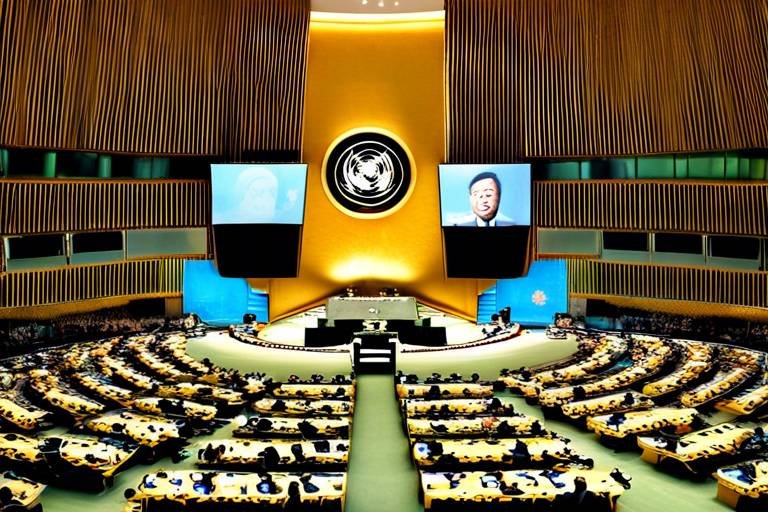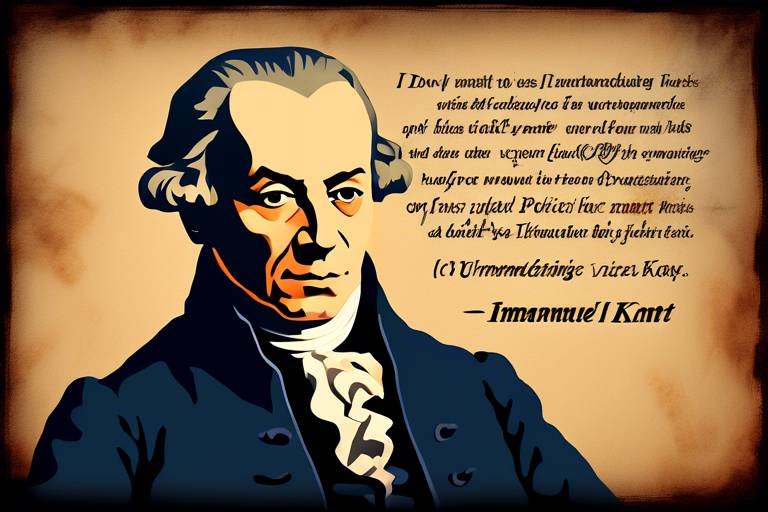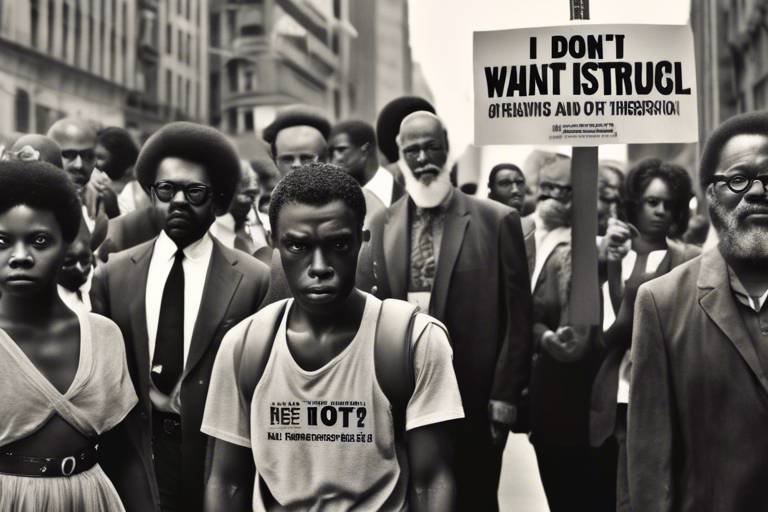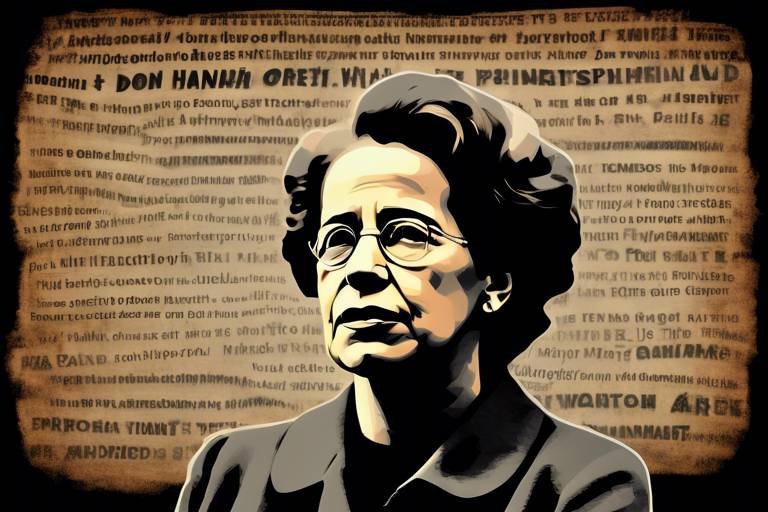Decoding the Philosophy Behind the United Nations’ Politics
The United Nations (UN) stands as a beacon of hope in a world often marred by conflict and division. But what really drives this colossal entity? What philosophies underpin its political maneuvers? Understanding the UN's political strategies is not just about knowing its structure or its member states; it’s about delving into the very essence of its core beliefs. The UN is more than a collection of nations; it’s a reflection of humanity’s aspirations for peace, security, and cooperation. This article aims to peel back the layers of the UN's political philosophy, revealing how these guiding principles shape global governance, diplomacy, and international relations.
The UN was founded in the aftermath of World War II, a time when the world desperately sought a new path forward. The foundational principles of the organization—peace, security, and human rights—serve as the bedrock upon which its mission is built. These principles are not merely abstract concepts; they are the driving forces behind every resolution, every peacekeeping mission, and every diplomatic effort. By understanding these principles, we can grasp the UN's overarching goal: to promote a world where nations can coexist in harmony, free from the specter of war.
However, the journey of the UN is not without its challenges. A constant tension exists between two philosophical perspectives: realism and idealism. Realism, with its focus on power dynamics and national interests, often clashes with the idealistic vision of a world united in cooperation and mutual respect. This dichotomy influences how the UN approaches international conflicts, sometimes leading to decisions that prioritize state interests over collective well-being. For instance, when faced with a humanitarian crisis, should the UN intervene despite potential backlash from sovereign nations? This question encapsulates the heart of the philosophical debate within UN politics.
At the core of this discussion lies the concept of sovereignty. Sovereignty is a double-edged sword; it grants nations the right to govern themselves but can also hinder collective action in times of crisis. The UN often finds itself in a delicate dance, trying to respect a nation’s sovereignty while advocating for the greater good. This balance is crucial, as the UN’s effectiveness hinges on its ability to navigate these conflicting interests. The challenge is not merely theoretical; it manifests in real-world scenarios where the UN must decide whether to intervene in a sovereign state’s affairs.
To illustrate this, consider the following case studies where sovereignty conflicts arose:
| Case Study | Year | Outcome |
|---|---|---|
| Syria Civil War | 2011-Present | Ongoing humanitarian crisis; limited UN intervention |
| Libya Intervention | 2011 | Successful intervention but led to ongoing instability |
| Rwanda Genocide | 1994 | Failure to intervene; significant loss of life |
These case studies highlight the complexities and limitations of the UN’s authority. Each situation reveals the intricate balance the UN must maintain between respecting state sovereignty and fulfilling its mission to protect human rights. The implications of this balance are profound, as they shape global governance and the UN’s ability to address international crises effectively.
Moreover, human rights serve as a philosophical foundation for the UN's actions. The Universal Declaration of Human Rights, adopted in 1948, underscores the organization's commitment to promoting and protecting the rights and dignity of individuals worldwide. This commitment influences not only the UN's policies but also its relationships with member states. When a country violates human rights, the UN is often called upon to act, whether through sanctions, diplomatic pressure, or peacekeeping missions.
Multilateralism is another key strategy employed by the UN in its quest to tackle global issues. By fostering cooperation among member states, the UN can address complex challenges that no single nation can solve alone. However, this approach is not without its hurdles. The rise of nationalism in recent years poses significant challenges to multilateralism, as countries increasingly prioritize their interests over collective goals. This trend threatens to undermine the very foundations of the UN's mission.
Despite these challenges, there are notable success stories in multilateralism that demonstrate the UN's effectiveness. From the Paris Agreement on climate change to the Global Health Initiative, collaborative efforts have led to significant advancements in addressing global issues. These successes remind us that while the road may be fraught with obstacles, the spirit of cooperation can lead to meaningful change.
- What is the main purpose of the United Nations? The UN aims to promote peace, security, and cooperation among nations to prevent conflict and foster international relations.
- How does the UN address human rights violations? The UN addresses human rights violations through various mechanisms, including sanctions, investigations, and peacekeeping missions.
- What role does multilateralism play in UN politics? Multilateralism allows the UN to unite member states to tackle global challenges collectively, enhancing the effectiveness of its initiatives.

The Foundational Principles of the UN
The United Nations (UN) stands as a beacon of hope in a world often fraught with conflict and division. At the heart of this international organization lie its foundational principles, which serve as the bedrock for its mission and operations. These principles—peace, security, and human rights—are not just lofty ideals; they are the guiding stars that inform every decision made within the UN framework. Understanding these principles is essential if we want to grasp how the UN navigates the complex waters of global governance.
To delve deeper, let’s break down these core principles:
- Peace: The UN was established with the primary goal of maintaining international peace and security. This principle is not merely about the absence of war but encompasses the promotion of peaceful relations among nations through diplomacy and dialogue.
- Security: Security is a multifaceted concept that includes not only military security but also economic, environmental, and human security. The UN seeks to address the root causes of conflict, thereby fostering a more stable world.
- Human Rights: Central to the UN’s philosophy is the promotion and protection of human rights. This principle asserts that every individual is entitled to fundamental rights and freedoms, regardless of nationality, ethnicity, or religion. The Universal Declaration of Human Rights, adopted in 1948, serves as a cornerstone document that outlines these rights.
These principles are interlinked, creating a comprehensive framework for the UN’s operations. For instance, achieving peace often requires addressing human rights violations that can lead to conflict. Similarly, ensuring security involves not just military measures but also social and economic stability.
In practice, the UN employs various mechanisms to uphold these principles. Through peacekeeping missions, diplomatic negotiations, and human rights advocacy, the organization strives to create a world where peace and justice prevail. However, the path is often fraught with challenges. The complexities of international relations, differing national interests, and the ever-changing geopolitical landscape can hinder the UN’s ability to fully realize its foundational goals.
Moreover, the effectiveness of the UN is often scrutinized. Critics argue that the organization sometimes falls short in enforcing its principles, particularly in regions plagued by conflict or where human rights abuses are rampant. Yet, despite these criticisms, the UN remains committed to its mission, continually adapting its strategies to better serve the global community.
In summary, the foundational principles of the United Nations—peace, security, and human rights—are essential for understanding its role in global governance. They not only shape the organization’s policies but also reflect the collective aspirations of humanity for a better world. As we explore further into the philosophical dimensions of UN politics, it’s crucial to remember that these principles are not just theoretical concepts; they are the lifeblood of international cooperation.
- What is the primary goal of the United Nations?
The primary goal of the UN is to maintain international peace and security. - How does the UN promote human rights?
The UN promotes human rights through various treaties, declarations, and monitoring mechanisms. - What are peacekeeping missions?
Peacekeeping missions are operations conducted by the UN to help maintain peace and security in conflict-affected areas.

Realism vs. Idealism in UN Politics
The landscape of international relations is often painted in shades of gray, where the philosophical battle between realism and idealism plays a pivotal role in shaping the United Nations' political strategies. At first glance, these two schools of thought may seem oppositional, but they often intertwine in complex ways, influencing how the UN approaches global issues. Realism, with its pragmatic focus on power dynamics and national interests, often serves as a counterbalance to idealism, which champions the pursuit of global cooperation and humanitarian ideals.
Realists argue that the international system is anarchic; in other words, there is no overarching authority to enforce rules or norms. This perspective leads to a focus on state sovereignty and the pursuit of national interests, often at the expense of collective global efforts. For instance, when a nation prioritizes its security over humanitarian concerns, it exemplifies the realist approach. In contrast, idealism posits that nations can transcend their self-interests in favor of collective goals, such as peace and human rights. This philosophical lens encourages the UN to promote dialogue and cooperation, even when faced with significant obstacles.
To illustrate the tension between these two philosophies, consider the UN's approach to international conflicts. In scenarios like the Syrian Civil War, the UN's idealistic goals of humanitarian intervention and peacekeeping often clash with the realist stance of powerful nations prioritizing their geopolitical interests. As a result, the UN frequently finds itself in a precarious position, attempting to mediate between conflicting national interests while striving to uphold its founding principles.
Moreover, this philosophical dichotomy shapes not only the UN's responses to crises but also its long-term strategies. For example, the UN often relies on multilateral agreements to address global issues like climate change or terrorism, reflecting an idealistic belief in collective action. However, the effectiveness of these agreements can be undermined by the realist tendencies of member states, who may choose to act unilaterally if they perceive their national interests at stake. This creates a cycle where the UN's authority is challenged, leading to questions about its relevance in a world increasingly characterized by nationalism and unilateralism.
In navigating this complex terrain, the UN must continually balance the demands of realism and idealism. Understanding this interplay is crucial for comprehending the organization's mission and the challenges it faces. The effectiveness of the UN hinges on its ability to harness the strengths of both philosophies—using realism to inform its strategies while remaining anchored in the idealistic pursuit of a more peaceful and equitable world.
Ultimately, the debate between realism and idealism in UN politics reflects broader questions about the nature of international relations. Can nations work together for the common good, or are they doomed to act solely in their self-interest? As the world evolves, the UN's ability to reconcile these conflicting philosophies will be vital for its success in fostering global governance and diplomacy.
- What is realism in international relations? Realism is a school of thought that emphasizes the competitive and conflictual side of international relations, focusing on states' interests and power dynamics.
- What is idealism in international relations? Idealism is a perspective that advocates for international cooperation and the promotion of global values such as peace, democracy, and human rights.
- How does the UN balance realism and idealism? The UN navigates the tension between these philosophies by employing realistic strategies while striving to uphold its idealistic principles in global governance.

The Role of Sovereignty
Sovereignty is a cornerstone concept in international relations, often regarded as the ultimate authority of a state over its territory and the people within it. In the context of the United Nations (UN), the role of sovereignty presents a fascinating paradox. On one hand, the UN was established to promote peace, security, and cooperation among nations; on the other hand, it must respect the sovereignty of its member states. This balancing act can often feel like walking a tightrope, where one misstep could lead to significant diplomatic fallout. The UN's ability to navigate these complexities is crucial for its effectiveness in addressing global challenges.
The principle of sovereignty means that states have the right to govern themselves without external interference. However, this right can clash with the UN's mission to intervene in humanitarian crises or conflicts that threaten international peace. For instance, when a government commits human rights violations against its own citizens, the UN faces a moral dilemma: should it respect the sovereignty of that state, or should it take action to protect those in danger? This situation illustrates the tension between the UN's ideals and the realities of international politics.
To further understand this dynamic, consider the following key aspects of sovereignty in relation to the UN:
- Non-Interference: The UN generally respects the principle of non-interference in the internal matters of sovereign states. This principle is enshrined in the UN Charter, which emphasizes the importance of state sovereignty.
- Collective Security: The UN operates on the premise that collective security can sometimes necessitate intervention, even if it means infringing on a state's sovereignty. This is particularly evident in cases of genocide or mass atrocities.
- Responsibility to Protect (R2P): This emerging norm suggests that the international community has a responsibility to intervene when a state is unwilling or unable to protect its citizens from serious harm.
The UN's approach to sovereignty is further complicated by the diverse political landscapes of its member states. For instance, powerful nations may wield their influence to prioritize their interests over collective action, often leading to accusations of hypocrisy. In contrast, smaller or less powerful states may feel marginalized, fearing that their sovereignty is compromised in favor of more powerful allies. This dynamic can lead to a sense of mistrust among member states, which complicates the UN's mission.
In conclusion, the role of sovereignty within the UN framework is a double-edged sword. While it is essential for maintaining order and respect among nations, it also poses significant challenges for the UN's ability to respond effectively to global crises. The organization must continuously adapt its strategies to balance respect for sovereignty with the urgent need for collective action, especially in an increasingly interconnected world. Understanding this delicate balance is crucial for anyone looking to grasp the complexities of international relations and the UN's role within it.

Case Studies of Sovereignty Conflicts
When we think about the United Nations and its role in global politics, one of the most complex issues it faces is the concept of sovereignty. This principle is often at odds with the UN's mission to promote peace and security. Let's dive into some compelling case studies that illustrate the challenges the UN encounters in navigating these turbulent waters.
One prominent example is the Rwandan Genocide of 1994. The UN was criticized for its inaction during this horrific event, where an estimated 800,000 Tutsis were killed in a span of just 100 days. The principle of sovereignty played a significant role here; the UN hesitated to intervene militarily, fearing it would violate Rwanda's sovereignty. This case highlights the dilemma: should the UN have prioritized humanitarian intervention over respect for national borders? The aftermath of the genocide sparked debates on the concept of the Responsibility to Protect (R2P), which argues that the international community has a duty to intervene when a state fails to protect its citizens.
Another significant case is the ongoing conflict in Syria. Since 2011, the Syrian civil war has drawn in multiple foreign powers, each with its own interests. The UN has struggled to mediate peace talks, largely due to the conflicting interests of member states and the Syrian government's insistence on sovereignty. The use of chemical weapons by the Assad regime raised questions about the UN's ability to act decisively. Despite clear violations of international law, the UN's hands were tied by the need to respect Syria's sovereignty, leading to frustration among those advocating for intervention.
In contrast, the Libyan intervention in 2011 showcases a scenario where the UN authorized military action based on humanitarian grounds. The situation was dire, as Muammar Gaddafi's regime threatened to commit mass atrocities against civilians. The UN Security Council passed Resolution 1973, allowing member states to take all necessary measures to protect civilians. While this intervention was initially seen as a success, it also raised questions about the long-term consequences of intervening in a sovereign nation. The aftermath saw Libya descend into chaos, leading many to wonder if the UN had overstepped its bounds.
These case studies reveal the intricate balance the UN must maintain between respecting state sovereignty and fulfilling its mandate to protect human rights and maintain international peace. Each conflict presents unique challenges, and the UN continues to grapple with the implications of its decisions. The tension between these two principles often leads to debates about the effectiveness and legitimacy of the UN as a global governing body.
In conclusion, the case studies of Rwanda, Syria, and Libya illustrate the profound complexities of sovereignty in international relations. They serve as poignant reminders that while the UN strives to uphold its core principles, the realities of global politics often complicate its efforts. As we move forward, understanding these conflicts will be crucial for fostering a more effective and responsive international system.
- What is the Responsibility to Protect (R2P)?
R2P is a global political commitment endorsed by all member states of the United Nations in 2005, which aims to prevent genocide, war crimes, ethnic cleansing, and crimes against humanity. - Why does the UN struggle with sovereignty issues?
The UN often faces a dilemma between respecting a nation's sovereignty and the need to intervene for humanitarian reasons, leading to complex political negotiations and decisions. - What are the consequences of UN interventions?
Interventions can lead to positive outcomes, such as protecting civilians, but they can also result in unintended consequences, including long-term instability and conflict.

Implications for Global Governance
The implications of sovereignty on global governance are profound and multifaceted. At its core, the tension between state sovereignty and the need for collective action creates a complex landscape for the United Nations. While the UN was established to promote international cooperation, the principle of sovereignty often acts as a double-edged sword. On one hand, it protects nations from external interference, ensuring that each state has the right to self-determination. On the other hand, this very principle can hinder the UN's ability to intervene in crises, particularly when a state is unwilling to cooperate or when its actions violate international norms.
For instance, consider the Syrian conflict, which serves as a poignant example of the challenges posed by sovereignty in global governance. The UN faced significant obstacles in addressing the humanitarian crisis due to the Syrian government's refusal to allow foreign intervention. This situation illustrates the limitations of the UN's authority when dealing with a state that prioritizes its sovereignty over the welfare of its citizens. As a result, millions suffered, and the international community was left grappling with the ethical implications of non-intervention.
Moreover, the balance between respecting sovereignty and ensuring global stability raises critical questions about the effectiveness of international law. The UN often finds itself in a precarious position, needing to uphold the principles of sovereignty while simultaneously advocating for human rights and global security. This dichotomy can lead to a perception of inconsistency in the UN's actions, where some interventions are justified while others are not, based solely on the political context of the situation.
To navigate these complexities, the UN has developed mechanisms for collective action that aim to respect state sovereignty while addressing global issues. For example, peacekeeping missions are often deployed with the consent of the host nation, which theoretically maintains the principle of sovereignty. However, the effectiveness of such missions can be compromised if the host nation is unwilling to cooperate fully or if there is a lack of resources and political will among member states.
In summary, the implications of sovereignty for global governance are a balancing act. The UN must continually adapt its strategies to respect state sovereignty while striving to fulfill its mandate of promoting peace, security, and human rights. This ongoing struggle underscores the need for a more nuanced understanding of sovereignty within the context of international relations. As global challenges become increasingly interconnected, the ability of the UN to navigate these waters will determine its relevance and effectiveness in the years to come.
- What is the role of the United Nations in global governance?
The UN plays a crucial role in promoting international cooperation, maintaining peace and security, and protecting human rights across the globe. - How does sovereignty affect UN interventions?
Sovereignty can limit the UN's ability to intervene in a nation's affairs, especially if the government does not consent to outside involvement. - What are some challenges to multilateralism faced by the UN?
The rise of nationalism and unilateral actions by member states can undermine the effectiveness of multilateral efforts to address global issues. - Can the UN enforce human rights without violating sovereignty?
The UN seeks to balance respecting sovereignty with the need to protect human rights, often relying on collective action and diplomatic engagement.

Human Rights as a Philosophical Foundation
The concept of human rights serves as a vital cornerstone in the philosophy of the United Nations (UN). At its core, human rights represent the fundamental entitlements that every individual possesses, regardless of their nationality, ethnicity, or beliefs. These rights are not merely abstract ideals; they are essential for the dignity and well-being of all people. The UN's commitment to promoting and protecting human rights is not just a matter of policy—it is a reflection of the organization’s foundational principles. By prioritizing human rights, the UN aims to create a world where every individual can thrive, free from oppression and injustice.
One of the most significant documents that encapsulate this commitment is the Universal Declaration of Human Rights, adopted in 1948. This groundbreaking declaration outlines a comprehensive range of rights, including the right to life, liberty, and security, as well as rights to education, work, and participation in government. It stands as a beacon of hope and a guiding framework for nations around the globe. The UN continually uses this declaration to hold governments accountable and to advocate for those whose rights are violated. This brings us to the question: how does the UN navigate the complexities of human rights in its operations?
In practice, the UN employs various mechanisms to monitor and promote human rights. These include the establishment of human rights treaties and the appointment of special rapporteurs who investigate and report on specific issues. For instance, the UN Human Rights Council regularly reviews the human rights records of member states, providing a platform for dialogue and accountability. However, the challenge lies in the enforcement of these rights. While the UN can advocate and provide recommendations, it often lacks the power to compel states to comply. This raises an important point: can the UN effectively champion human rights without the cooperation of member states?
Moreover, the intersection of human rights with other global issues—such as climate change, migration, and economic inequality—illustrates the complexity of the UN's mission. For example, the right to a healthy environment is increasingly recognized as a human right, emphasizing that environmental degradation directly impacts individuals' rights to health and well-being. This interconnectedness challenges the UN to adopt a holistic approach to human rights, integrating them into all aspects of its work.
| Human Rights Issues | UN Mechanisms |
|---|---|
| Violence against women | Convention on the Elimination of All Forms of Discrimination Against Women (CEDAW) |
| Children's rights | Convention on the Rights of the Child (CRC) |
| Freedom of expression | Special Rapporteur on the promotion and protection of the right to freedom of opinion and expression |
In conclusion, human rights are not just a philosophical foundation for the UN; they are a living, breathing commitment that shapes its actions and policies. The UN's endeavors to uphold these rights reflect a deep-seated belief in the inherent dignity of all individuals. While challenges remain, the organization's unwavering focus on human rights continues to inspire hope and drive progress on a global scale. As we navigate the complexities of international relations, one thing is clear: the fight for human rights is a fight for humanity itself.
- What are human rights? Human rights are the basic rights and freedoms to which all humans are entitled, including the right to life, liberty, and personal security.
- How does the UN promote human rights? The UN promotes human rights through various treaties, monitoring mechanisms, and dialogue with member states.
- What is the Universal Declaration of Human Rights? Adopted in 1948, it is a milestone document that outlines the fundamental rights and freedoms that all individuals are entitled to.
- Why are human rights important? They are essential for ensuring dignity, freedom, and justice for all individuals, serving as a foundation for peace and stability in societies.

The Role of Multilateralism
Multilateralism stands as a cornerstone of the United Nations' approach to global governance, embodying the belief that collective action is essential in addressing the myriad challenges that transcend national borders. In a world that is increasingly interconnected, the UN’s commitment to multilateralism enables nations to collaborate on a scale that would be impossible through unilateral or bilateral efforts alone. This collaborative spirit is not merely a lofty ideal; it is a practical necessity, given the complexity of issues such as climate change, terrorism, and pandemics, which require a united front to tackle effectively.
At its core, multilateralism involves multiple countries working together to achieve common goals. The UN serves as a platform where member states can engage in dialogue, negotiate treaties, and coordinate responses to global crises. This approach is vital because it fosters a sense of shared responsibility and mutual accountability among nations. When countries come together to address issues collectively, they not only pool their resources but also share their expertise and perspectives, which can lead to more comprehensive and effective solutions.
Moreover, multilateralism enhances the legitimacy of international actions. When decisions are made collectively, they are more likely to be accepted by the global community. For instance, the adoption of the Paris Agreement on climate change in 2015 exemplifies how multilateral negotiations can lead to significant commitments from countries worldwide. This landmark accord, which aims to limit global warming to well below 2 degrees Celsius, was only possible through the concerted efforts of nearly 200 nations. Such large-scale agreements demonstrate that when nations unite, they can tackle even the most daunting challenges.
However, the path of multilateralism is not without its obstacles. The rise of nationalism and populism in various parts of the world has created a challenging environment for the UN and its member states. Countries that prioritize their national interests over collective goals often undermine the spirit of cooperation that multilateralism thrives on. This trend raises critical questions about the future of global governance and the UN's role in fostering collaboration amidst growing divisions.
Despite these challenges, the UN has witnessed numerous success stories that underscore the power of multilateralism. For example, the Global Fund to Fight AIDS, Tuberculosis, and Malaria has mobilized resources from governments, private sector partners, and civil society to combat these diseases effectively. This initiative showcases how collaborative efforts can lead to significant advancements in public health, saving millions of lives in the process.
In conclusion, the role of multilateralism within the United Nations is pivotal for addressing global challenges. By promoting cooperation, fostering dialogue, and facilitating collective action, multilateralism not only enhances the effectiveness of international responses but also reinforces the principles of peace and security that the UN stands for. As we navigate the complexities of the 21st century, embracing multilateralism will be essential in ensuring a stable and prosperous future for all nations.
- What is multilateralism? Multilateralism refers to the practice of multiple countries working together on common issues, often facilitated by international organizations like the UN.
- Why is multilateralism important? It is crucial for addressing global challenges that no single nation can tackle alone, fostering cooperation, and enhancing the legitimacy of international actions.
- What are some examples of successful multilateral efforts? The Paris Agreement on climate change and the Global Fund to Fight AIDS, Tuberculosis, and Malaria are notable examples of successful multilateral initiatives.
- How does nationalism affect multilateralism? The rise of nationalism can undermine multilateral efforts by prioritizing national interests over collective goals, creating challenges for global cooperation.
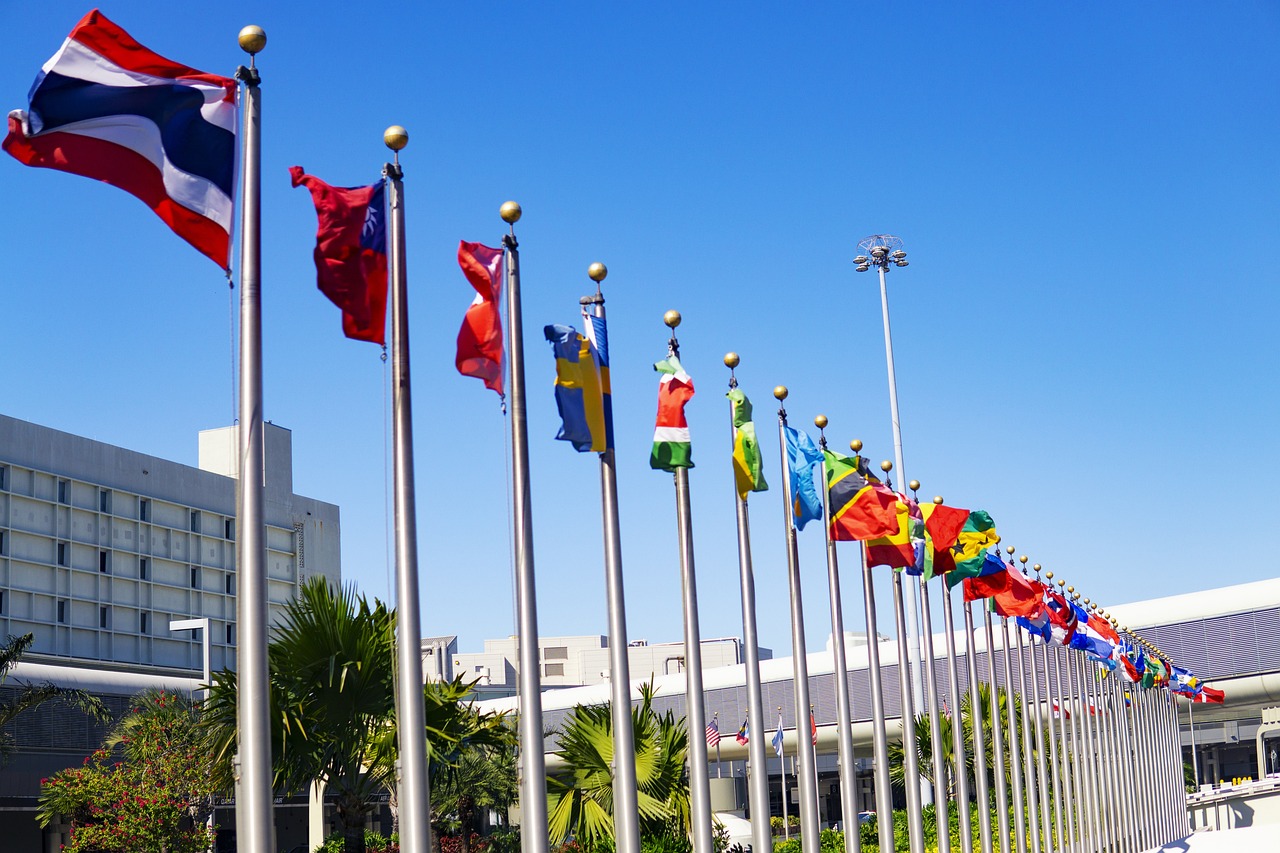
Challenges to Multilateralism
The landscape of international relations is constantly evolving, and with it comes a myriad of challenges to multilateralism. At its core, multilateralism is about nations coming together to tackle global issues collectively. However, recent trends indicate a growing reluctance among some states to engage in this cooperative framework. One of the most pressing challenges is the rise of nationalism. As countries prioritize their own interests over global cooperation, the very foundation of multilateralism is put to the test. This shift can lead to a fragmented international community where unilateral actions become more common, undermining the effectiveness of organizations like the UN.
Moreover, the increasing complexity of global issues, such as climate change, migration, and pandemics, requires a level of collaboration that is often difficult to achieve. The COVID-19 pandemic serves as a prime example of this challenge. Initially, countries acted independently, hoarding resources and prioritizing their populations over global solidarity. This reaction not only hampered a coordinated response but also highlighted the fragility of multilateral agreements in times of crisis.
Another significant challenge arises from the growing influence of non-state actors, including multinational corporations and non-governmental organizations (NGOs). These entities often operate outside the traditional state-centric framework and can sometimes undermine multilateral efforts. For instance, in the realm of environmental policy, corporations may prioritize profit over global commitments, complicating negotiations and diluting the impact of multilateral agreements.
To illustrate the impact of these challenges, consider the following table that outlines key barriers to effective multilateralism:
| Challenge | Description |
|---|---|
| Nationalism | Countries focusing on their own interests can hinder collective action. |
| Complex Global Issues | Interconnected challenges require unprecedented levels of cooperation. |
| Non-State Actors | Influence of corporations and NGOs can complicate negotiations. |
| Geopolitical Tensions | Rivalries among major powers can stymie collaborative efforts. |
Additionally, geopolitical tensions among major powers, such as the United States, China, and Russia, create an environment where multilateralism can be seen as a threat to national sovereignty. As these nations vie for dominance, the potential for cooperation diminishes, leading to a cycle of distrust and competition. This not only affects current multilateral agreements but also discourages future collaborations.
In conclusion, while multilateralism remains a vital approach to addressing global challenges, it faces significant hurdles. The rise of nationalism, the complexity of issues, the influence of non-state actors, and geopolitical tensions all contribute to a precarious environment where collective action is increasingly difficult. To navigate these challenges, the UN and its member states must reaffirm their commitment to multilateralism, fostering an environment where collaboration is prioritized, and the interests of the global community are placed above individual national agendas.
- What is multilateralism? Multilateralism refers to the practice of multiple countries working together on a given issue, often through international organizations like the UN.
- Why is multilateralism important? It enables countries to address global challenges collaboratively, promoting peace, security, and development.
- What are some examples of successful multilateralism? The Paris Agreement on climate change and the World Health Organization's response to health crises are notable examples.
- How does nationalism affect multilateralism? Nationalism can lead countries to prioritize their own interests over collective goals, undermining cooperative efforts.

Success Stories of Multilateralism
When we think about the power of multilateralism, it's hard not to be inspired by the remarkable achievements that have emerged from collective action. The United Nations, as a beacon of hope for international cooperation, has facilitated numerous success stories that demonstrate the effectiveness of nations coming together for a common cause. One shining example is the Paris Agreement, a landmark accord that aims to combat climate change. Adopted in 2015, this agreement brought together almost every country on the planet, uniting them under the shared goal of limiting global warming to well below 2 degrees Celsius. It's a testament to what can be achieved when countries prioritize the health of our planet over individual interests.
Another success story is the Global Vaccine Alliance (GAVI), which has played a pivotal role in improving access to vaccines in developing countries. By pooling resources and expertise from various nations and organizations, GAVI has managed to vaccinate millions of children, significantly reducing the incidence of diseases like measles and polio. This initiative exemplifies how multilateral efforts can lead to tangible improvements in public health, demonstrating that when we work together, we can overcome even the most daunting challenges.
Moreover, the UN's peacekeeping missions stand as a testament to the power of multilateralism in maintaining global peace and security. For instance, the United Nations Stabilization Mission in Haiti (MINUSTAH) helped restore order following a devastating earthquake in 2010. By deploying troops and resources from multiple countries, the mission not only provided immediate humanitarian assistance but also contributed to long-term stability in the region. Such missions highlight how collaborative efforts can foster peace and rebuild nations in crisis.
These success stories serve as powerful reminders that while the challenges of multilateralism are real, the rewards can be monumental. The key takeaway is that when nations set aside their differences and work together, they can achieve extraordinary results. However, the journey is not without its hurdles. As we celebrate these victories, it’s also essential to recognize the ongoing need for commitment and collaboration among member states to address the pressing global issues that remain.
- What is multilateralism? Multilateralism is the process of multiple countries working together on a given issue, often through international organizations like the UN.
- Why is multilateralism important? It fosters cooperation and collective action, allowing countries to tackle global challenges more effectively than they could individually.
- Can you give examples of successful multilateral efforts? Yes, notable examples include the Paris Agreement on climate change and the Global Vaccine Alliance (GAVI).
Frequently Asked Questions
- What are the foundational principles of the United Nations?
The United Nations is built on essential principles such as peace, security, and human rights. These principles guide the organization's mission and operations, aiming to foster international cooperation and promote global stability.
- How do realism and idealism influence UN politics?
The tension between realism and idealism plays a significant role in shaping the UN's approach to international conflicts. Realism focuses on power dynamics and state interests, while idealism emphasizes cooperation and moral values. This duality affects decision-making and the effectiveness of the UN in addressing global issues.
- What is the significance of sovereignty in UN operations?
Sovereignty is a critical concept in international relations, representing a state's authority and independence. The UN faces the challenge of balancing respect for state sovereignty with the necessity for collective action, especially during humanitarian crises or conflicts.
- Can you provide examples of sovereignty conflicts in UN history?
Yes! Historical instances like the Rwandan Genocide and the Syrian Civil War highlight the complexities the UN faces when state sovereignty clashes with the need for intervention. These case studies reveal the limitations of the UN's authority and the difficulties in enforcing its resolutions.
- How do human rights shape the UN's policies?
Human rights are at the core of the UN's philosophy. The promotion and protection of human rights influence its policies and actions, driving initiatives aimed at ensuring dignity, equality, and justice for all individuals worldwide.
- What is the role of multilateralism in addressing global issues?
Multilateralism is a key strategy employed by the UN to tackle global challenges. By fostering collective action among member states, the UN enhances its effectiveness in addressing issues like climate change, terrorism, and public health crises.
- What challenges does multilateralism face today?
The rise of nationalism presents significant challenges to multilateralism. As countries prioritize their own interests over collective goals, the UN's ability to foster cooperation and resolve global issues becomes increasingly difficult.
- Are there any success stories of multilateralism?
Absolutely! There are notable success stories, such as the Paris Agreement on climate change and the global response to HIV/AIDS. These instances demonstrate how collaborative efforts can lead to significant advancements in addressing pressing global challenges.

